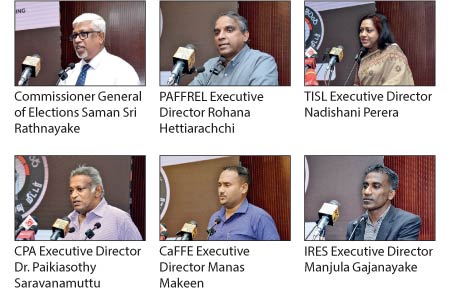Wednesday Feb 18, 2026
Wednesday Feb 18, 2026
Wednesday, 21 August 2024 04:13 - - {{hitsCtrl.values.hits}}
 By Tania de Silva
By Tania de Silva
For the first time in Sri Lanka, six prominent election observation organisations have established a ‘Campaign Finance Observation Online Tool’ to monitor the campaign expenditures of election candidates for the 2024 Presidential Election.
The tool, named ‘Chanda Salli Meetare’, aims to advocate for the effective implementation of the Regulation of Election Expenditure Act of 2023, empower citizens with vital information to make informed voting decisions, ensure a level playing field among Presidential candidates and foster a free, fair, and inclusive electoral environment that upholds democratic values.
The institutions are —Transparency International Sri Lanka (TISL), People’s Action for Free and Fair Elections (PAFFREL), Campaign for Free and Fair Elections (CaFFE), Centre for Monitoring Election Violence (CMEV), Hashtag Generation and the Institute for Democratic Reforms and Electoral Studies (IRES).
The collaborative tool was launched on Friday at BMICH in Colombo, with the presence of Election Commission members and the Commissioner General of the Election Commission of Sri Lanka, presidential candidates and their representatives, political party representatives, diplomatic missions, and civil society organisations.
The tool is designed to contribute to the long-term goals of promoting transparency and accountability in Sri Lanka’s electoral processes. By increasing public awareness of the role of money in election campaigns and its influence on voter decisions, it encourages citizen engagement in campaign finance through the dedicated website www.chandasallimeetare.lk
TISL Executive Director Nadishani Perera said: “Though the Regulation of Election Expenditure Act was implemented last year, this is the first time we can check whether the law is working properly. This is the first time we’re using this tool, and your feedback is important to improve it. Since there will be more elections in the future, we need to refine the tool.”
Campaign expenditure is calculated based on predetermined minimum average costs and formulas for each category. In addition to dedicated monitoring of social media and mainstream media-based campaigning, election observers will be deployed across the country by the election watchdogs to gather information on ground-level election expenditures in their respective electorates. The website also provides the facility for citizens to submit information about campaign activities of candidates.
IRES Executive Director Manjula Gajanayake said: “This time, 17 million people are eligible to vote. It’s essential that we ensure transparency in campaign finance so that every vote counts equally, and the electoral process remains free from undue financial influence.”
The law requires all election candidates and parties to submit their financial reports after the election to the Election Commission. By implementing this tool, the financial data contained in the reports can be compared with the findings of the campaign finance observations collectively done by the Election Monitoring Organisations and reported through the website.
PAFFREL Executive Director Rohana Hettiarachchi commented on the necessity of timely reporting, stating, “Whether a candidate wins or loses, they must submit the correct financial report on time. Otherwise, they are engaging in wrongdoing in the eyes of the law. We saw vote-buying in recent elections in Thailand and Indonesia, and we aim to minimise and stop such corruption.”
Centre for Policy Alternatives Executive Director Dr. Paikiasothy Saravanamuttu emphasised the importance of accountability in campaign finance, stating, “The Campaign Finance Meter is founded on the principle that without restrictions, the electoral process would be distorted. Those who spend more are likely to get more votes. While comprehensive evidence on this is limited, it is crucial to restore discipline among political parties and candidates to ensure a fair democratic process.”
A Secretariat, consisting of a dedicated team of campaign finance experts and an IT specialist, has been set up to handle the back-end system of the tool. All data submitted by election observers and citizens will be verified before being made publicly available through the ‘Chanda Salli Meetare’.
The scope of observations will be limited to a selected number of key cost categories that are feasible to monitor within the capacity of these organisations and therefore will not reflect the entirety of each candidate’s expenditure. The tool, which will first be executed at the Presidential election, is expected to be adapted and extended to upcoming elections as well.
The election observation organisations appeal to citizens to get involved and support this process by tracking the election expenditures of candidates and submitting information on campaign activities in their respective areas through the user-friendly website, accessible via mobile phones or computers. At the same time, they call upon all Presidential candidates to adhere to campaign expenditure laws and demonstrate their commitment to transparency and accountability.
The mobile application went live from 19 August allowing community members to use the platform for tracking and reporting campaign finances
Pix by Upul Abayasekara